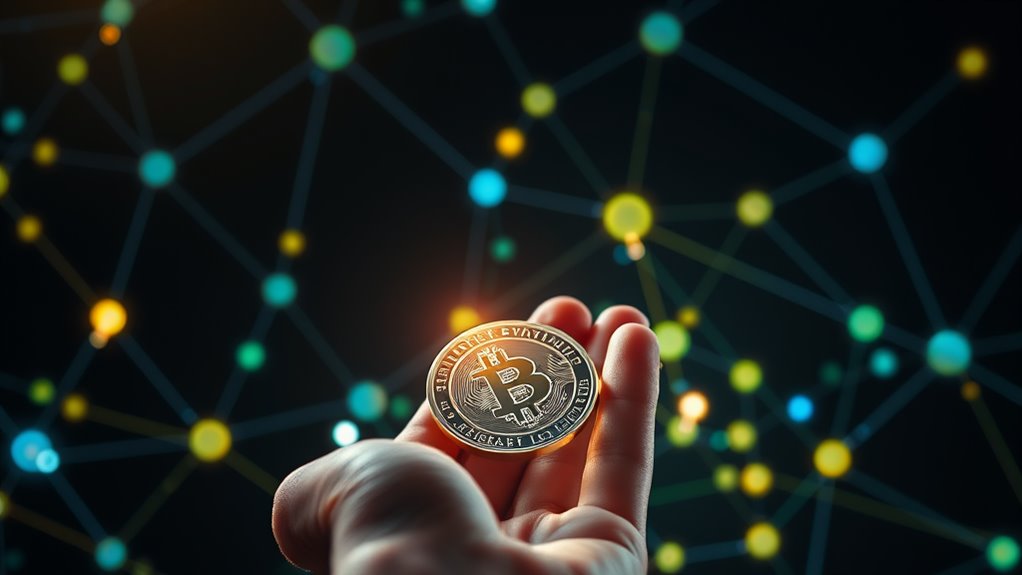
What Is Defi: Unlocking the Power of Decentralized Finance
DeFi, or decentralized finance, represents a blockchain-based financial ecosystem operating without traditional intermediaries like banks. It leverages smart contracts to provide services including lending, trading, and payments—all accessible to anyone with internet access. Core principles include transparency, openness, and inclusivity, creating lower fees and 24/7 availability. Though powerful, DeFi presents challenges including regulatory uncertainty and technical complexity. The transformation of traditional finance through this technology continues to evolve rapidly.
Key Takeaways
- DeFi eliminates traditional intermediaries through blockchain technology, enabling peer-to-peer financial transactions with greater transparency and accessibility.
- Smart contracts automate financial processes in DeFi, reducing costs and improving efficiency across lending, trading, and insurance services.
- DeFi platforms operate 24/7 globally, providing financial services to 1.7 billion unbanked individuals and reducing transaction fees.
- Users can access innovative investment opportunities like yield farming, governance tokens, and decentralized exchanges without traditional financial gatekeepers.
- Despite risks from smart contract vulnerabilities and regulatory uncertainty, DeFi aims to create a more inclusive and equitable financial ecosystem.
The Fundamental Principles of Decentralized Finance

Decentralized Finance, commonly known as DeFi, represents a paradigm shift in how financial systems operate in the digital age. Built on blockchain technology, DeFi eliminates traditional intermediaries like banks and financial institutions by distributing control among users through peer-to-peer networks.
The core principles of DeFi revolve around five key concepts: decentralization, transparency, inclusivity, openness, and programmability. Transactions occur directly between parties and are recorded on public blockchains, allowing for real-time verification and auditing.
Smart contracts—self-executing agreements with coded terms—automate financial processes without human intervention, reducing costs and increasing efficiency. This innovative system enables users to engage in financial activities with a level of trust and security previously unattainable.
Perhaps most notably, DeFi platforms are accessible to anyone with internet access, regardless of location or socioeconomic status, creating a more equitable financial ecosystem that transcends geographic and institutional boundaries.
How Blockchain Technology Powers the DeFi Ecosystem

At the foundation of every DeFi application lies blockchain technology, a revolutionary system that fundamentally transforms how financial transactions occur in the digital sphere. This distributed ledger technology records transactions across a decentralized network of nodes, eliminating the need for central authorities and reducing potential fraud.
Blockchain platforms like Ethereum, Binance Smart Chain, and Solana host DeFi applications through smart contracts—self-executing agreements with coded terms that automate financial operations. These smart contracts enable services such as lending, borrowing, and trading without intermediaries.
The technology’s immutability guarantees that once recorded, transactions cannot be altered. Additionally, blockchain’s global accessibility opens financial services to anyone with internet access, while its programmability supports the development of transparent, community-governed decentralized applications (dApps). Moreover, the integration of DeFi with traditional finance is driving the evolution of modern financial systems.
Key DeFi Services Transforming Traditional Finance

Innovations in decentralized finance have introduced a suite of services that fundamentally challenge conventional financial systems. These services operate entirely on blockchain networks, eliminating traditional intermediaries while enabling global access through internet connections.
Core DeFi offerings include lending platforms like Aave and Compound, where users can instantly borrow or lend cryptocurrencies without credit checks, secured by digital collateral.
Blockchain-based lending protocols enable instant cryptocurrency loans secured solely by digital assets, bypassing traditional credit verification systems.
Decentralized exchanges such as Uniswap facilitate 24/7 peer-to-peer trading of cryptocurrencies and tokens. For international payments, services leveraging blockchain reduce transaction times and fees compared to traditional remittance options.
Additionally, DeFi has expanded into insurance and asset management, with smart contracts automating coverage and investment strategies. The underlying principle of over-collateralization ensures that loans are secured, providing a unique risk management approach not found in traditional finance.
These platforms offer yield farming and staking, creating new passive income opportunities unavailable in traditional finance.
The Unique Benefits of Participating in DeFi Markets

Why are millions of people worldwide turning to decentralized finance despite its relative newness in the financial landscape?
DeFi offers unprecedented advantages over traditional financial systems by removing barriers to entry and enhancing user experience.
- Global Access and Inclusion – DeFi provides financial services to 1.7 billion unbanked adults worldwide, requiring only an internet connection rather than traditional banking infrastructure.
- Efficiency and Cost Reduction – Transactions occur 24/7 without intermediaries, reducing fees and settlement times.
- Innovative Investment Vehicles – Users can leverage yield farming, governance tokens, and IDOs for new earning opportunities.
- Enhanced Security and Transparency – Blockchain technology guarantees all transactions are verifiable, tamper-proof, and controlled entirely by users.
In addition, DeFi’s ability to eliminate intermediaries leads to lower transaction costs, making financial services more accessible to everyone.
These benefits collectively represent a significant evolution in how financial services can be accessed and utilized globally.
Navigating Risks and Challenges in the DeFi Landscape

While decentralized finance offers transformative potential, participants must carefully navigate significant risks and challenges inherent to this evolving ecosystem.
Smart contract vulnerabilities remain a primary concern, with reentrancy attacks potentially causing substantial financial losses. Many projects launch without proper third-party audits, compounding these risks.
The regulatory landscape presents additional challenges, as unclear regulations leave both developers and users in uncertain territory. Moreover, issues like accountability and compliance in DeFi are still unresolved, further complicating the landscape.
High transaction costs and network congestion on popular blockchains create scalability issues that hinder widespread adoption.
Moreover, DeFi’s complexity and steep learning curve create barriers for non-technical users.
The concentration of activity around a few major protocols introduces systemic risks, as failures in one system can rapidly affect interconnected platforms.
Understanding these challenges is essential for responsible DeFi participation.
Real-World Applications of DeFi for Everyday Users

Numerous everyday individuals are discovering practical applications for decentralized finance in their financial activities.
DeFi platforms offer accessible alternatives to traditional banking systems, allowing users to engage with financial services on a global scale without intermediaries.
DeFi democratizes global finance by eliminating middlemen and opening banking alternatives to anyone with internet access.
Four key applications benefiting everyday users include:
- Lending and borrowing through liquidity pools, enabling interest earning without traditional banking requirements.
- Cross-border payments and remittances with reduced fees and faster transaction times.
- Savings opportunities through yield farming and stablecoin deposits that often exceed traditional bank rates.
- Access to financial services for the underbanked, providing basic financial tools regardless of geographic location.
These applications demonstrate how DeFi can serve practical purposes beyond investment speculation, creating tangible value for regular users worldwide. Furthermore, understanding DeFi platforms is essential to effectively navigate this rapidly evolving financial landscape.
The Future Outlook for DeFi’s Global Impact

How might decentralized finance reshape the global financial landscape in the coming years?
Experts anticipate that DeFi will experience widespread adoption globally, with particular growth in emerging markets where traditional banking infrastructure is limited. These regions stand to benefit considerably from improved financial inclusion through DeFi-based microloans and accessible financial services.
As regulatory frameworks become clearer, institutional investment is expected to accelerate, bringing substantial capital into the ecosystem.
Technological advancements in cross-chain interoperability and layer 2 solutions will likely enhance transaction efficiency and user experience.
The integration of DeFi with traditional finance could create hybrid products, while stablecoins will continue to play an essential role in reducing volatility and enabling wider adoption. Moreover, the rise of automated market makers will facilitate seamless trading experiences, further driving user engagement in DeFi platforms.
Frequently Asked Questions
How Do I Calculate and Report Defi Taxes?
Calculating DeFi taxes requires determining cost basis for each transaction, identifying taxable events, and choosing an accounting method. Reporting involves Forms 8949, Schedule D, Schedule 1, and Form 1040. Professional assistance is recommended due to complexity.
Can I Participate in Defi Without Technical Blockchain Knowledge?
Yes, users can participate in DeFi without technical blockchain knowledge through user-friendly platforms, simplified interfaces, and educational resources. However, understanding basic concepts and using community support greatly improves the experience and reduces risks.
What Hardware Wallets Offer the Best Defi Security?
Top hardware wallets for DeFi security include Ledger Nano X for mobile access, Trezor for robust protection, Keystone Pro for air-gapped solutions, Cypherock X1 for split-key security, and Tangem for card-like convenience.
How Much Capital Should Beginners Invest in Defi?
Beginners should start with $100-$500 in DeFi, investing only what they can afford to lose. This allows them to learn the ecosystem while minimizing exposure to volatility and security risks.
Can Defi Protocols Function During Widespread Internet Outages?
Despite being a cut above traditional finance, DeFi protocols generally cannot function during widespread internet outages as they require network connectivity to interact with blockchain networks and execute smart contracts.
Conclusion
Decentralized finance continues to reshape traditional financial systems through innovative blockchain-based solutions that prioritize accessibility, transparency, and autonomy. As adoption grows, DeFi’s influence on global finance appears increasingly significant. Recent data shows total value locked in DeFi protocols surpassed $100 billion in 2021, demonstrating remarkable market confidence despite regulatory uncertainties. For everyday users, DeFi represents both opportunity and responsibility in a rapidly evolving financial ecosystem.














